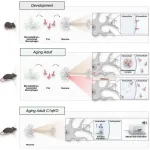(Press-News.org) Embargoed for release until 5:00 p.m. ET on Monday 15 July 2024
Annals of Internal Medicine Tip Sheet
@Annalsofim
Below please find summaries of new articles that will be published in the next issue of Annals of Internal Medicine. The summaries are not intended to substitute for the full articles as a source of information. This information is under strict embargo and by taking it into possession, media representatives are committing to the terms of the embargo not only on their own behalf, but also on behalf of the organization they represent.
----------------------------
1. Survey finds women in their 40s may choose to delay mammography when informed about the benefits and harms
Abstract: https://www.acpjournals.org/doi/10.7326/M23-3325
Editorial: https://www.acpjournals.org/doi/10.7326/M24-0885
URL goes live when the embargo lifts
A nationally representative U.S. survey found women in their 40s may decide to start mammography at an older age when informed about the benefits and potential harms of breast cancer screening, including overdiagnosis and the risk for a false positive result. Women who wanted to delay screening after being presented with a decision aid describing the evidence were at a lower breast cancer risk than those who wanted screening at their current age. These findings are particularly relevant as the U.S. Preventive Services Task Force (USPSTF) recently changed its recommendation for mammography screening from informed decision making to biennial screening for women aged 40 to 49 years. The study is published in Annals of Internal Medicine.
Researchers from the University of Colorado School of Medicine, Denver VA Center of Innovation surveyed 495 women aged 39 to 49 years without a history of breast cancer or a known BRCA1/2 gene mutation to assess screening preferences before and after receipt of a decision aid describing the benefits and harms of beginning screening at age 40. The researchers found that before the decision aid, 8.5% of participants preferred to wait until 50 to screen versus 18% after reading the decision aid. There was no increase in the number of participants who said they never wanted to have mammograms, suggesting that the evidence did not discourage screening altogether. Persons with higher breast cancer risk preferred earlier screening. More than a quarter of participants indicated that overdiagnosis was different than what their doctor told them and almost one-third found that information about overdiagnosis conflicted with other messaging about screening. These findings suggest that providing information about both benefits and harms may change intention to screen for some women.
An accompanying editorial from the University of Toronto touches on the importance of informed decision making with regard to breast cancer screening, as well as equitable access to care.
Media contacts: For an embargoed PDF, please contact Angela Collom at acollom@acponline.org. To speak with the corresponding author, Laura D. Scherer, PhD, please contact David Kelly, david.kelly@cuanschutz.edu
----------------------------
2. GLP-1RAs not associated with increased risk for suicidal thoughts or behaviors
Abstract: https://www.acpjournals.org/doi/10.7326/M24-0329
URL goes live when the embargo lifts
A target trial emulation study found no increased risk for suicidal thoughts or behaviors associated with the use of GLP-1RAs (glucagon-like peptide-1 receptor agonists) to treat type 2 diabetes (T2D). This is important because GLP-1RAs are used to manage T2D and have been found to reduce appetite by altering reward effects in the brain, which helps to treat obesity, as well. However, there is some concern that this mechanism of action could increase suicidal thoughts and risk. The findings are published in Annals of Internal Medicine.
Researchers from the University of Florida College of Pharmacy studied U.S. national Medicare administrative data from January 2017 to December 2020 to investigate the association between GLP-1RAs, compared with sodium–glucose cotransporter-2 inhibitors (SGLT2is) or dipeptidyl peptidase-4 inhibitors (DPP4is), and risk for suicidal ideation and behaviors in older adults with T2D. The data comprised more than 21,000 adults aged 66 years and older who had T2D, no record of suicidal ideation at baseline, and who were initiating treatment with one of the three classes of medication. The researchers compared the occurrence of suicidal behaviors based on diagnostic codes on the Medicare claims files after being prescribed the medications to that of similar patients matched on clinical and demographic factors who were also started on the medications. The researchers did not find an increase in risk of suicidal behaviors associated with GLP1-RAs after a median of a little over a year and a half. Similarly, no clear increase in risk was observed in the matched pairs of patients on GLP1-RA versus SGLT2-Is.
Media contacts: For an embargoed PDF, please contact Angela Collom at acollom@acponline.org. To speak with the corresponding author, Jingchuan Guo, MD, PhD, please email Matt Splett at msplett@ufl.edu.
----------------------------
3. Hospital-onset SARS-CoV-2 infection associated with significant morbidity and mortality during Omicron era
Abstract: https://www.acpjournals.org/doi/10.7326/M24-0199
URL goes live when the embargo lifts
A retrospective matched cohort study found that SARS-CoV-2 infections acquired while in the hospital continue to be associated with significant morbidity and mortality, even during the Omicron era. These findings suggest that hospitals should take measures to prevent in-hospital SARS-CoV-2 infections, particularly when community SARS-CoV-2 rates are elevated. The findings are published in Annals of Internal Medicine.
Researchers from Harvard Medical School and Harvard Pilgrim Health Care Institute retrospectively analyzed adult patients admitted to 5 Massachusetts hospitals affiliated with the Mass General Brigham System between December 1, 2020 and April 30, 2023 to estimate the impact of hospital-onset SARS-CoV-2 on patients’ outcomes during the pre-Omicron and Omicron periods. Hospital-onset SARS-CoV-2 was defined as a positive test on hospital day 5 or later after negative admission tests. Infected patients were matched to control patients by hospital, service, demographics, comorbidities, and severity of illness, and assessed for hospital mortality, time to discharge, and other outcomes. The researchers found that during the pre-Omicron period, hospital-onset SARS-CoV-2 infection was associated with significantly greater risk for ICU admission, greater need for high-flow oxygen by nasal cannula, and higher risk of hospital death. During the Omicron period, hospital-onset infections continued to be associated with increased risk for ICU admission, as well as higher risk for mechanical ventilation. The impact of hospital-onset SARS-CoV-2 on hospital death was attenuated but still significant.
According to the study authors, hospitals should continue to take precautions to protect patients from hospital-acquired SARS-CoV-2 infection. Possible measures include masking during patient interactions, surveillance testing, instituting policies to encourage employees to stay home when sick and encouraging vaccination. The authors acknowledge that some of these measures are burdensome on staff and hospitals. They suggest that one-way hospitals can balance their ethical obligation to protect patients against the burden of protective measures is to institute these measures just when SARS-CoV-2 rates are elevated.
Media contacts: For an embargoed PDF, please contact Angela Collom at acollom@acponline.org. To speak with the corresponding author, Michael Klompas, MD, MPH, please email Haley Bridger at hbridger@mgb.org.
----------------------------
4. Experts create framework to identify and address “spin” in research reporting
Nearly half of reviews that assessed harms were found to contain some type of spin
Abstract: https://www.acpjournals.org/doi/10.7326/M24-0771
URL goes live when the embargo lifts
An international team of researchers specializing in spin and reporting bias created a framework to provide guidance for authors, peer reviewers, and editors to recognize and rectify “spin,” or the misleading reporting, interpretation, and extrapolation of findings in primary and secondary research, such as systematic reviews. The authors say it is important for reviewers to be clear about the limitations of the evidence that they have for harms and to not overstate confidence in their findings, as readers may draw the wrong conclusions or inferences. Spin was found to be fairly common, especially when reporting harms. The framework is published in Annals of Internal Medicine.
Researchers from the University of Colorado Anschutz Medical Campus and team gathered instances of spin from a random sample of 100 systematic reviews of interventions to identify and address instances of spin. Of the 58 reviews that assessed harm and the 42 that did not, they found, respectively, that 28 (48%) and 6 (14%) had at least 1 of the 12 types of spin (grouped into 7 categories) they had identified for harms. Inappropriate extrapolation of the results and conclusions for harms to populations, interventions, outcomes, or settings not assessed in a review was the most common category of spin in 17 of 100 reviews. The authors revised the examples to remove spin, considering the context, findings for harms, and methodological limitations of the original reviews. Their goal is to provide a framework for researchers and reviewers to avoid spin, enhancing the clarity and accuracy of harms reporting in systematic review publications.
Media contacts: For an embargoed PDF, please contact Angela Collom at acollom@acponline.org. To speak with the corresponding author, Riaz Qureshi, PhD, please contact rachel Wittel at RACHEL.WITTEL@CUANSCHUTZ.EDU.
----------------------------
END
Survey finds women in their 40s may choose to delay mammography when informed about the benefits and harms
2024-07-15
ELSE PRESS RELEASES FROM THIS DATE:
CDI scientists ID ‘unconventional’ new pathway for TB vaccines
2024-07-15
An “unconventional” immune response now identified by scientists from the Hackensack Meridian Center for Discovery and Innovation (CDI) is a potential new pathway for developing new vaccines for tuberculosis (TB), according to a new publication.
Marginal zone B (MZB) cells are a natural response to TB infection which has been long overlooked - and which might be a welcome new target that could be bolstered through new vaccines to better combat and prevent the disease, according to the new publication in the journal Cell Reports.
“Our results indicate that B cells skew their immune landscape ...
Mendoza, Weiss receive $2.6 million grant to study biomechanics of lung tumors
2024-07-15
Michelle Mendoza, PhD, researcher at Huntsman Cancer Institute and associate professor of oncological sciences at the University of Utah (the U) and Jeffrey Weiss, PhD, professor of biomedical engineering and faculty member in the Scientific Computing and Imaging Institute at the U, are the recipients of a $2.6 million grant from the National Institutes of Health (NIH) to research how tension in lung tissue affects the growth and distribution of tumors. This innovative approach could uncover new mechanisms for understanding how lung cancer develops.
“There ...
Study shows how narcissistic CEOs influence the board of directors to take more risk
2024-07-15
Narcissistic CEOs that also serve as chair of the board are adept at controlling how their boards of directors focus their attention, giving the CEO the ability to get their way. A new study published in the Strategic Management Journal found that by driving board discussions about risk-taking to hold a positive tone, narcissistic CEOs can allocate more resources toward risk-taking strategies. The findings deepen our understanding of how CEO behavior and personality types can drive risk management strategies.
The research team — Christopher S. Tuggle of the University of Central Arkansas, Cameron J. Borgholthaus of the University of Wyoming, Peter D. Harms of the University of Alabama, ...
Study shows timely transition from pediatric to adult care is critical for young adults with sickle cell disease
2024-07-15
Sickle cell disease is the most common inherited red blood cell disorder in the United States and can lead to health problems including organ dysfunction, acute chest syndrome and strokes over a patient’s lifespan. According to a new study, individuals living with sickle cell disease who experience a delay of more than six months after transferring from pediatric to adult care are twice as likely to be hospitalized compared to those who transition in less than two months.
In the study, Kristen ...
University of Cincinnati study: Long-term stroke survival improving, but racial disparities remain
2024-07-15
Overall rates of long-term survival following stroke are improving, but Black individuals experience worse long-term outcomes compared to white individuals, according to University of Cincinnati research published online July 15 in Neurology®, the medical journal of the American Academy of Neurology.
UC’s David Robinson, MD, corresponding author on the research, said prior studies had examined short-term stroke outcomes of 30 or 60 days, but this time the team looked at survival rates five years past a person’s stroke.
“This was ...
National Institutes of Health grant could mean progress toward improved outcomes for stroke patients
2024-07-15
The Associate Dean of Research at the University of Tennessee Health Science Center’s College of Nursing has received a two-year, $421,188 grant from the National Institutes of Health (NIH) to improve cognitive screening in people who suffer from a devastating type of stroke called aneurysmal subarachnoid hemorrhage (aSAH).
Professor Ansley Stanfill, PhD, RN, FAAN, has devoted her program of research to improving outcomes for people who survive strokes. Her latest grant aims to determine if an existing screening tool can be used in a new way to assess patients following aSAH and trigger a ...
SfN establishes James L. Roberts Endowed Fund
2024-07-15
Washington, D.C. – The Society for Neuroscience (SfN) has received $128,000 from the estate of James L. Roberts, PhD. With the funds, SfN Council voted to create a new long-term endowed fund, The James L. Roberts Fund, and will use the income from its investments to create and perpetually fund James L. Roberts Trainee Professional Development Awards (TPDAs) beginning at Neuroscience 2024.
“I knew Jimmy Roberts very well. We basically launched neurobiology at Sinai when we co-directed the Fishberg Research Center for Neurobiology at Mount Sinai from 1989–2002,” said incoming SfN President John Morrison. “Jimmy was an outstanding ...
Unlocking the mystery of preexisting drug resistance: New study sheds light on cancer evolution
2024-07-15
CLEVELAND—The evolution of resistance to diseases, from infectious illnesses to cancers, poses a formidable challenge.
Despite the expectation that resistance-conferring mutations would dwindle in the absence of treatment due to a reduced growth rate, preexisting resistance is pervasive across diseases that evolve—like cancer and pathogens—defying conventional wisdom.
In cancer, it is well known that small numbers of drug-resistant cells likely exist in tumors even before they’re treated. In something of a paradox, before treatment, these mutants have been repeatedly shown to have lower fitness than the surrounding ancestor cells from which they arose. It leads ...
New study reveals critical role of C1q protein in neuronal function and aging
2024-07-15
BOSTON, Mass. (July 15, 2024)—A groundbreaking study conducted at the lab of Beth Stevens, PhD, at Boston Children’s Hospital has revealed that an immune protein impacts neuronal protein synthesis in the aging brain. Previous work from the Stevens lab had uncovered that immune cells in the central nervous system, microglia, help prune synapses in the developing brain by tagging synapses with the immune protein C1q. New research led by Nicole Scott-Hewitt, published in Cell, shows that neurons can also internalize C1q. C1q seems to influence protein production inside neurons by interacting with ribosomal proteins, RNA-binding proteins, and ...
New research demonstrates potential for increasing effectiveness of popular diabetes, weight-loss drugs
2024-07-15
A network of proteins found in the central nervous system could be harnessed to increase the effectiveness and reduce the side effects of popular diabetes and weight-loss drugs, according to new research from the University of Michigan.
The study, appearing today in the Journal of Clinical Investigation, focused on two proteins called melanocortin 3 and melanocortin 4 found primarily on the surface of neurons in the brain that play a central role in regulating feeding behavior and maintaining the body's energy balance.
Melanocortin ...





